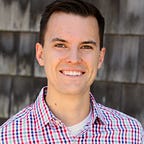The Night I Lost $1,000,000
Self-doubt, conviction, and the joy/horror of founding a startup
In January 2019, I entered a pitch competition to try to win a million-dollar prize with a new startup idea. I prepared like a champion: I practiced my pitch so incessantly that even my girlfriend could easily recite it from memory. When the time came, I took the stage confidently and pitched my heart out. I nailed all of my talking points, and, frankly, I felt like I had a very real chance to end the night in the money. As all founders do, I started dreaming about what it would be like to have that kind of investment in my startup — and to realize the dreams that had brought me to Silicon Valley in the first place.
After the last pitch, the judges deliberated for what felt like an eternity, then got on stage to announce the results. And the first name they called was mine! I had won… second place. The first place team took home $1,000,000. I got a kitschy trophy, a firm handshake, and an email from my co-founder the next day that said he was leaving me to intern at Facebook.
Such is the rollercoaster of founding a company: high highs, low lows, and little in between. But even though I had lost one million dollars, I was surprised to find myself relieved. Truth be told, I wasn’t yet sure if my idea would work. I had convinced the judges, but I hadn’t yet convinced myself.
Self-doubt while starting something new is entirely normal. Y Combinator founder Paul Graham wrote a great essay this week titled “Early Work,” where he said:
One of the biggest things holding people back from doing great work is the fear of making something lame. And this fear is not an irrational one. Many great projects go through a stage early on where they don’t seem very impressive, even to their creators. You have to push through this stage to reach the great work that lies beyond…
Unfortunately, if you want to do new things, you’ll face a force more powerful than other people’s skepticism: your own skepticism. You too will judge your early work too harshly.
This was the story of my entire, year-long journey with my startup idea. I went to battle every day not only with the skepticism of the entire world — huge incumbents, enterprise customers, and expensive engineers — but also my own self-doubt.
Sometimes, it’s best to blast through self-doubt and to just keep trucking. In fact, putting on the blinders and constructing your own “reality distortion field” is often seen as a skill worth cultivating in Silicon Valley, as I covered in last week’s edition. But my founding experience taught me that when those thoughts linger, you should listen to them.
Aaron Dinin, an entrepreneurship professor at Duke, wrote an essay this week about why founders should be comfortable bugging potential sales leads, in which he said:
Remember — if you believe in the value of what you’re selling and the value it will provide to your customers, you’re never bugging them. You’re trying to help them. In fact, the only bad sign is that you’re worried about bugging people. If you’re genuinely worried you’re bugging people, maybe you need to reconsider whether you truly believe in what you’re building.
I’m not sure I entirely agree with Dinin. Doing something truly new will never feel as socially comfortable as taking the well-trodden path to become a lawyer, doctor, or consultant. But his broader point is really insightful: self-doubt is okay, as long as it’s eventually outweighed by your conviction.
With my startup, I ultimately found that I had the self-doubt but not the conviction: a losing combo. In retrospect, winning the $1,000,000 award only would have made the decision to shut down my company harder. (And, if I’m being honest, I really loved the kitschy trophy.)
I’ve kept this lesson with me ever since: folding a losing hand is a win in Silicon Valley — because as soon you fold, you’re ready to play the next hand.
Originally published in Silicon Valley Outsider, a weekly newsletter for prospective founders and startup enthusiasts who live outside Silicon Valley. Subscribe now — the email edition also includes weekly news from the startup zeitgeist and bite-sized introductions to famous startup operators in the Valley.
Special shoutout to Bee Partners for hosting an awesome event, and being such an important part of my startup journey (in so many ways).
